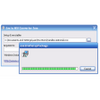Create cross platform installers in a flash
Create cross platform installers in a flash
Pros
- Cross-platform support for Linux, Windows, macOS, and Solaris
- Updater functionality for automatic software updates
- Extensive language compatibility including Java, PHP, Perl, Python, Ruby, C/C++, and .NET/Mono
- Multiple installer modes: GUI, text, and unattended
- Fast and efficient installer performance
Cons
- A steep learning curve for those new to application packaging
- May require a seasoned programmer to fully utilize its features
Efficient Installer Creation with Cross-Platform Support
Introduction to BitRock InstallBuilder
BitRock InstallBuilder stands out as a comprehensive solution for developers looking for an efficient way to distribute their applications across various operating systems. It is a development tool tailored to simplify the process of creating reliable and versatile installers for software targeting desktop and server environments.
Compatibility and Cross-Platform Capability
One of the most notable features of BitRock InstallBuilder is its vast compatibility with different platforms. Whether you are deploying on Linux, Windows, macOS, or Solaris, the tool provides a streamlined approach to reach users irrespective of their OS choice. This cross-platform functionality is crucial in today's diverse computing landscape, where users can be found across a variety of environments.
Updater Functionality
To maintain a user's software at the latest version, InstallBuilder includes a feature that allows developers to build an updater alongside the installer. This component is particularly useful as it ensures that end-users receive the necessary updates automatically, making the maintenance of software more efficient for both creators and consumers.
Support for Multiple Programming Languages
The flexibility of BitRock InstallBuilder extends to its support for a range of programming languages. Whether the project is in Java, PHP, Perl, Python, Ruby, C/C++, or .NET/Mono, the tool accommodates the intricacies of these languages. It allows developers to package their applications without concerns about compatibility, thus addressing a critical need for versatile development tools in the modern software landscape.
Installation Modes
BitRock InstallBuilder doesn’t force a one-size-fits-all model for the installation process. Developers have the choice to create installers that operate in GUI, text, or unattended modes. This level of control ensures that the installation experience can be catered to the target user base, whether they prefer a graphical interface or a more automated, script-driven process.
Performance
A noteworthy advantage of using BitRock InstallBuilder is that it eliminates the need for a slow Java-based installer. Instead, the tool provides a native, responsive experience that reflects well on the software being installed. The responsiveness and speed of the installation process are important for a positive initial user experience.
Technical Expertise Required
While BitRock InstallBuilder offers vast potential, it is essential to note that it is designed with experienced developers in mind. Its powerful features and rich options demand a certain level of programming and packaging knowledge. Newcomers to application distribution may find the learning curve somewhat steep, but for seasoned professionals, the breadth of features is a major asset.
Conclusion
BitRock InstallBuilder exists as a high-caliber solution for software developers intent on delivering their applications across multiple platforms efficiently. It provides the versatility and support needed to address a variety of programming languages and user preferences, ensuring that the reach of an application is not limited by the user’s operating system or update mechanisms.
Pros
- Cross-platform support for Linux, Windows, macOS, and Solaris
- Updater functionality for automatic software updates
- Extensive language compatibility including Java, PHP, Perl, Python, Ruby, C/C++, and .NET/Mono
- Multiple installer modes: GUI, text, and unattended
- Fast and efficient installer performance
Cons
- A steep learning curve for those new to application packaging
- May require a seasoned programmer to fully utilize its features




